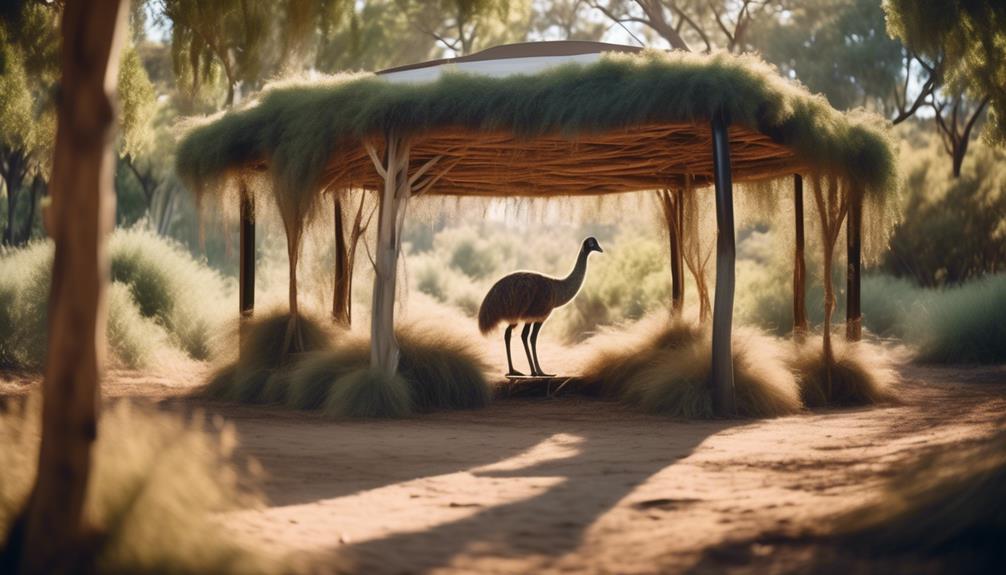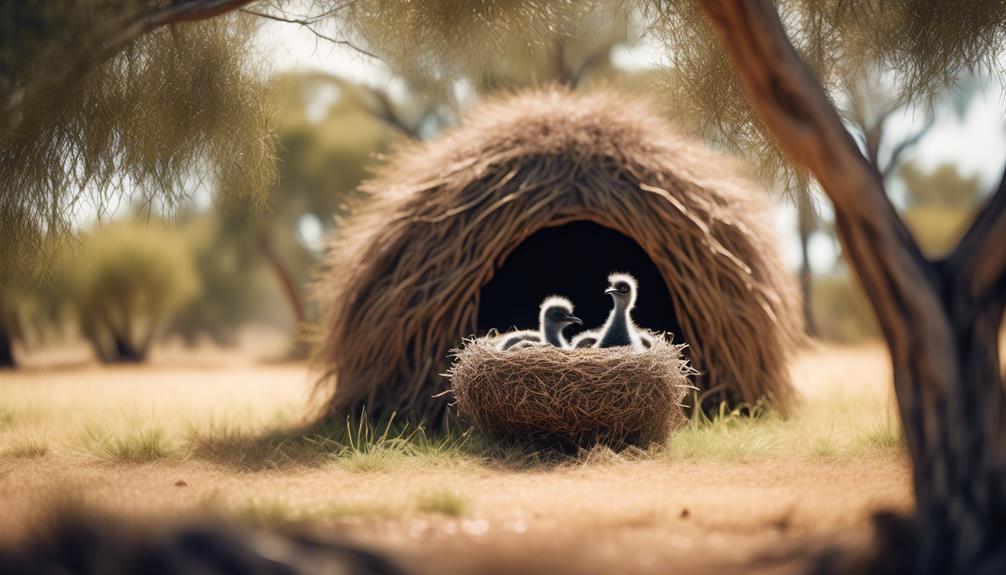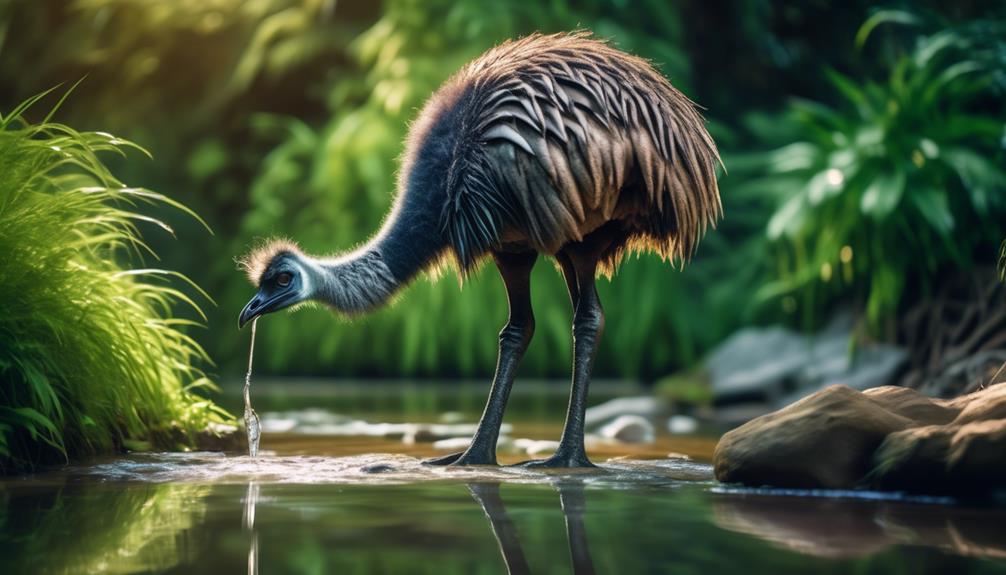
So, you've decided to venture into the world of emu ownership. Congratulations! These fascinating creatures can make for quite the unique addition to your property.
But before you can welcome your emu with open arms, it's crucial to create the perfect habitat for them to thrive. From determining the ideal enclosure size to providing adequate shelter and monitoring temperature levels, there are several key factors to consider.
But fear not, because in this discussion, we will guide you through the essential steps to ensure your emu feels right at home. And trust us, it's worth it – the sight of a contented emu strutting in its perfect habitat is truly something to behold.
Key Takeaways
- Emus thrive in social groups and it is recommended to have at least two emus in an enclosure.
- The minimum recommended enclosure size for a pair of emus is one acre, with a six-foot-high fence that is buried at least two feet underground to prevent escaping.
- Emus are herbivores and require a balanced diet of plants, including Tall Fescue, Clover, Alfalfa, and Timothy Grass. They should be fed twice a day and their portion sizes should be determined based on age, weight, and activity level.
- Emus need a well-ventilated shelter with proper insulation, adequate shade, and a designated nesting area with soft and cushioned materials such as straw, grass, and leaves. Regular monitoring of water quality and temperature regulation is also crucial for their health and well-being.
Determine the Ideal Enclosure Size
To create the perfect habitat for your emus, it's crucial to determine the ideal enclosure size. Understanding emu behavior and socialization is key to providing them with a comfortable and happy living space.
Emus are social animals and thrive in groups, so it's recommended to have at least two emus in an enclosure. The size of the enclosure will depend on the number of emus you plan to have.
For a pair of emus, the minimum recommended enclosure size is one acre. This allows them ample space to roam, run, and engage in natural behaviors. Emus are known for their curious nature, so providing them with a larger enclosure will give them more opportunities to explore and forage for food.
It is important to ensure that the enclosure is securely fenced to prevent emus from escaping and to keep predators out. Emus are strong and agile birds, so a six-foot-high fence is recommended. Additionally, the fence should be buried at least two feet underground to prevent digging.
Select the Right Vegetation for Grazing
To ensure that your emus have access to the right vegetation for grazing, it is important to carefully select the types of plants and grasses that will provide them with the necessary nutrition and dietary needs. Emus are herbivores and rely on a variety of plants for their diet. When choosing vegetation for grazing, consider their nutritional requirements, as well as grazing techniques for healthy vegetation growth and conservation efforts to protect grazing habitats.
| Vegetation | Nutritional Benefits |
|---|---|
| Tall Fescue | High in fiber and provides energy |
| Clover | Good source of protein and vitamins |
| Alfalfa | Rich in calcium and other essential minerals |
| Timothy Grass | High in fiber and low in sugar |
Grazing techniques such as rotational grazing can help maintain healthy vegetation growth. This involves dividing the grazing area into smaller sections and allowing emus to graze in one section while the others recover. This method prevents overgrazing and ensures a continuous supply of fresh vegetation.
Conservation efforts are crucial in protecting grazing habitats for emus. Avoid overgrazing by monitoring the vegetation and adjusting the number of emus accordingly. Implementing a reseeding program can help replenish vegetation and maintain a healthy habitat. Additionally, consider planting native grasses and plants that are well-suited for the local environment, as they require less maintenance and provide a natural food source for emus.
Provide Adequate Shelter and Shade

When providing for emus, it's essential to ensure they've adequate shelter and shade to protect them from the elements and promote their overall well-being. Emu housing requirements are fairly simple, but they must have a shelter that can protect them from extreme weather conditions such as heavy rain, strong winds, and intense heat. Emus have a natural instinct to seek shelter during adverse weather, so it's crucial to provide them with a suitable place to retreat.
When designing the emu habitat, you should consider constructing a sturdy shelter that provides enough space for the emus to move around comfortably. The shelter should be well-ventilated and have proper insulation to maintain a moderate temperature. Additionally, it should be designed to prevent the emus from escaping and protect them from potential predators.
In addition to shelter, providing adequate shade is also crucial for emus. Emus are native to Australia, where they're adapted to hot and dry climates. They're susceptible to heat stress, so it's important to create shaded areas within their habitat. This can be achieved by planting trees or installing shade structures. These shaded areas will help the emus cool down and protect them from direct sunlight, reducing the risk of heat-related illnesses.
Ensure Proper Fencing and Security Measures
Proper fencing and security measures are essential components to consider when creating the perfect emu habitat. These measures help ensure the safety and well-being of your emus, as well as prevent any potential escape or intrusion. Here are four important factors to keep in mind:
- Hire professional help: When it comes to installing the right fencing and security measures for your emus, it's advisable to seek assistance from professionals who've experience with emu habitats. They can assess your specific needs and recommend the most suitable options.
- Understand emu behavior and socialization: Emus are curious and intelligent birds that can be prone to escape attempts if they feel confined or stressed. It's important to design a fencing system that takes into account their natural behaviors and socialization needs. Providing enough space for them to roam and interact with other emus can help prevent any potential issues.
- Choose sturdy and secure fencing materials: Emus are strong and powerful birds, capable of jumping and even breaking through weak barriers. Opt for sturdy materials like chain-link or woven wire fencing that can withstand their strength. Additionally, ensure that the fencing is tall enough (at least 6 feet) to prevent them from jumping over.
- Implement additional security measures: Apart from the fencing, consider installing additional security measures such as locks, alarms, and surveillance cameras. These can help deter potential predators or intruders and provide you with peace of mind knowing that your emus are safe and secure.
Create a Suitable Nesting Area

Creating a suitable nesting area for your emus is crucial to their reproductive success and overall well-being. Emus are large, flightless birds known for their unique nesting behavior. To create the perfect nesting area for your emus, you'll need to provide them with the right materials and space.
First and foremost, emus prefer to nest on the ground, so make sure to designate a specific area for their nesting needs. The area should be spacious enough for the emu to comfortably sit and turn around. It should also be secluded and away from any potential disturbances.
When it comes to nesting materials, emus prefer soft and cushioned materials such as straw, grass, and leaves. These materials provide insulation and protection for the eggs. Make sure to regularly replenish the nesting materials to keep the nest clean and hygienic.
Emus are known to be territorial during the nesting season, so it's important to provide enough space between nesting pairs. This will help minimize any potential conflicts or disturbances.
Establish a Regular Feeding Schedule
To ensure the overall health and well-being of your emus, it's essential to establish a regular feeding schedule. Emus thrive on feeding consistency, and this ensures they're receiving the necessary nutrition requirements. Follow these four steps to create a regular feeding schedule that will keep your emus healthy and happy:
- Determine the number of feedings: Emus should be fed twice a day, once in the morning and once in the evening. This schedule mimics their natural feeding patterns and allows for proper digestion.
- Measure the appropriate amount of feed: Emus have specific nutrition requirements, so it's crucial to measure their feed accurately. Consult with a veterinarian to determine the appropriate portion size based on your emus' age, weight, and activity level.
- Provide a balanced diet: Emus require a variety of nutrients to thrive. Their diet should consist of high-quality emu pellets, fresh vegetables, and a source of calcium, such as crushed eggshells or oyster shells. Additionally, ensure they've access to fresh water at all times.
- Monitor their intake: Regularly observe your emus during feeding to ensure they're consuming their food. If any emu consistently refuses to eat or shows signs of decreased appetite, consult with a veterinarian to address any potential health concerns.
Maintain Clean Water Sources

For the emus to thrive and maintain their overall health, it's crucial to ensure that their water sources are kept clean and safe. Clean water is essential for the well-being of your emus, as contaminated water can lead to various health issues. To maintain clean water sources, it's important to implement effective water filtration methods and take measures to prevent water contamination.
One effective method to ensure clean water for your emus is to use a water filtration system. There are various types of water filtration systems available, such as activated carbon filters, sand filters, and UV sterilizers. These filters help remove impurities, such as bacteria, algae, and debris, from the water, ensuring that your emus have access to clean and safe drinking water.
In addition to using water filtration systems, it's important to prevent water contamination in the first place. Emus are known to defecate in water sources, which can contaminate the water and pose a health risk. To prevent this, regularly clean and disinfect water containers, ensuring that they're free from any feces or debris. It's also important to keep the water containers covered to prevent other animals or insects from contaminating the water.
Monitor and Maintain Optimal Temperature Levels
To ensure the optimal health and well-being of your emus, it's crucial to closely monitor and maintain the temperature levels in their habitat. Emus are native to Australia, where they're adapted to hot and dry climates. Therefore, it's essential to provide them with an environment that mimics their natural habitat.
Here are four key steps to effectively monitor and maintain optimal temperature levels for your emus:
- Monitor temperature fluctuations: Emus are sensitive to temperature changes, so it's important to regularly monitor the temperature in their habitat. Use a digital thermometer to accurately measure the temperature throughout the day. Keep track of any fluctuations to ensure the environment remains within the recommended range.
- Provide shade and ventilation: Emus need access to shade to avoid overheating. Ensure their habitat has ample shade structures or trees to protect them from direct sunlight. Additionally, proper ventilation is crucial to prevent the buildup of heat. Design the enclosure with sufficient airflow to keep the temperature regulated.
- Implement heating systems for colder climates: If you live in a colder climate, it's essential to provide heating systems during winter months. Emus can tolerate cooler temperatures, but extreme cold can be harmful to their health. Install a heating system, such as radiant heaters or heat lamps, to maintain a comfortable temperature.
- Use cooling systems for hotter climates: In hot climates, it's crucial to implement cooling systems to prevent heat stress in emus. Install misting systems or fans to provide relief from high temperatures. You can also create shallow pools or misting areas for the emus to cool themselves down.
Frequently Asked Questions
How Long Do Emus Typically Live in Captivity?
Emus typically live around 10-20 years in captivity. The lifespan can be influenced by factors such as diet, exercise, and overall care. Providing a suitable habitat with ample space and proper nutrition is crucial for ensuring a longer and healthier life for your emu.
What Types of Predators Should I Be Aware of When Designing the Enclosure?
When designing the enclosure for your emu, it's important to consider predator prevention. Ensure the walls are high enough to deter predators like foxes and secure the fencing to prevent digging. Safety first!
Can Emus Be Housed With Other Types of Birds or Animals?
Emus can be housed with other birds or animals, but caution is needed for compatibility and safety. Benefits include socialization, while challenges may arise from territoriality. Introduce them slowly, monitor interactions, and provide ample space and resources for all inhabitants.
How Do Emus Communicate With Each Other?
Emus communicate with each other through a combination of vocalizations and body language. Their calls can be compared to the sound of a trumpet, while their body movements convey various messages and emotions.
Are There Any Specific Health Concerns or Diseases That Emus Are Prone To?
Common health concerns and diseases in emus include avian influenza, coccidiosis, and bumblefoot. To prevent these, ensure proper hygiene, regular veterinary check-ups, a balanced diet, and a spacious habitat with appropriate bedding and shelter.
Conclusion
Congratulations! You're now equipped with the knowledge and tools to create the perfect habitat for your emu. By following these guidelines, you can ensure that your emu has a spacious enclosure, suitable vegetation for grazing, and adequate shelter and security.
Remember to provide a cozy nesting area, maintain a regular feeding schedule, and keep clean water sources available. Just like a well-tailored suit, your emu's habitat will be the perfect fit, allowing them to thrive and flourish.




